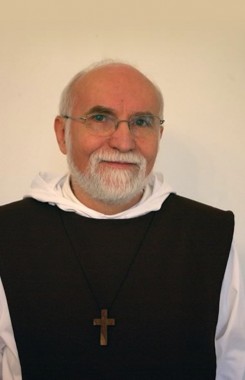Time for God
Father Jacques Philippe’s Classic on Mental Prayer
Time for God by Jacques Philippe is about mental prayer. Facing God in solitude and silence for a time, to enter into intimate, loving communication with him. I read this as a participant in a group study initiated by my covenant community, with talks each Sunday on the five chapters of this small but dynamic  book. It is a resource for beginners trying to establish a daily prayer time, and for many of us who know the value of this habit but have strayed from that well-spent time we offer God in which he transforms our lives.
book. It is a resource for beginners trying to establish a daily prayer time, and for many of us who know the value of this habit but have strayed from that well-spent time we offer God in which he transforms our lives.
Mental prayer is not a kind of Christian Yoga. Our life of prayer is not the result of technique but a gift we receive. In fact, St. Jane Frances de Chantal writes, “The best method of prayer is not to have one.” We don’t need a formula any more than we need a script when we get together with our best friend. Having a good time together happens naturally.
The highest priority of prayer is fidelity. That is what produces quality.
“Time spent faithfully persevering every day, even if poor quality-distracted prayer … will be infinitely more fruitful than the occasional long spells of prayer.”
We all respond to the Holy Spirit in our own way and timing. But when we try to answer the question of how to use our time in mental prayer, Fr. Philippe says, ”What matters is not the movement of the mind, but the deep orientation of the heart toward God.”
Two traps, three false arguments and two temptations
The two traps in thinking about prayer:
The two traps Fr. Philippe talks about are:
- Thinking that prayer is optional, and
- Thinking that I don’t need to pray. “I can just go to Mass” or “I can just receive the sacraments.”
Why are these either/or options not good enough? Because the Lord wants us in a personal relationship with him.
The three false arguments which surround time:
- “I don’t have enough time.” Any arguments that come up related to time are lies of Satan. Don’t fall for them.
- “If I give time to God, I won’t be able to take care of the others that I am responsible for.” Sound familiar?
- “I don’t have time to pray to the Lord and spend time with him because I pray at work. I’ll just take care of it at work,” so there is the substitute.
Two temptations that we deal with frequently:
- False sincerity. We feel our prayer time is not authentic because we rely on our emotions to make us feel good. That puts us in bondage. The Lord wants us to live in freedom to choose to spend time with him.
- False humility. Fr. Philippe uses Teresa of Avila as an example. She was trying to persevere in contemplative prayer and mental prayer. She kept recognizing all of her inadequacies, all of her faults and soon became discouraged. She ceased her mental prayer for a year. Discouragement is false humility.
His practicality is refreshing, like his caveat that we risk becoming discouraged if we take on more than we can handle. He encourages us to begin with twenty minutes to half an hour, which is better than two hours now and then.
Four truths to guide our journey in mental prayer.
- The Primacy of God’s action. What matters in mental prayer is not so much what we do, as what God does in us. “If our prayer consists of nothing more than holding ourselves before God without…thinking of anything special…but with a heartfelt attitude of availability and trusting abandonment – then we could not do any better.”
- The Primacy of love. This principle is connected to the primacy of God’s action because God’s first action toward us is love. We have to allow ourselves to be loved – first – and loved like small children who have a deep assurance of God’s love.
- We find God in the humanity of Jesus. Fr. Philippe suggests ways that we can come in deeper contact with the humanity of Jesus. We can meditate on his deeds and words or the events in Jesus’ life. We can adore his face in an icon or the Eucharist, pronouncing his name lovingly or repeating the Jesus Prayer. These should not be intellectual efforts, but a gaze of love coming from our hearts, clinging to our Savior Jesus.
- God dwells in our hearts. God uses creation, Scripture, the Eucharist and many other means to reveal his presence in our life. Fr. Philippe says what’s most important in the life of prayer is recognizing God’s presence in our hearts.
It’s all about transformation
 In Chapter 3, Fr. Philippe writes that we should not get hung up on vocabulary or methods and stages of prayer. We should not compare our prayer to anyone else’s. But one universal truth stands out: God transforms us. Our prayer goes from something active on our part, like meditating on scripture or intercession, to something passive on our part where the Lord does the acting.
In Chapter 3, Fr. Philippe writes that we should not get hung up on vocabulary or methods and stages of prayer. We should not compare our prayer to anyone else’s. But one universal truth stands out: God transforms us. Our prayer goes from something active on our part, like meditating on scripture or intercession, to something passive on our part where the Lord does the acting.
A friend of mine who read this book said that she had a good prayer life. Her transformation began with a cancer diagnosis. She poured her heart out to God about suffering, which only got worse. “My sickness brought me to a total end of myself. Everything I had known and expected came crashing down. The idols I didn’t even know I had, like health and future, were smashed,” she said, “As the carrying of the cross in my life went on and on, I ran out of things to say to the Lord. To some extent, for me, it was the long suffering and the months of carrying that cross that were actually a saving grace, because I got to the end of myself and my intellect. I would go to him in prayer and simply say, ‘I’ve got nothing, but I trust you.’”
Prayer of the heart
I like how Fr. Philippe signals the vital points he wants to make, and connects them deep into our hearts, such as his guidance about time for prayer:
Here is a point worth underlining: Mental prayer should not be treated as something exceptional, done at a time snatched with difficulty from other activities, but should become a habit, part of the normal rhythm of our lives, so that its place is never questioned, even for a single day. This will foster fidelity to mental prayer, which is essential.
Life is shaped by rhythms: the rhythm of heartbeat and breathing, the rhythm of day and night, of meals, of weeks, and so on. Mental prayer should become a daily event as vital to us as the basic rhythms of existence. It should become the breathing of our souls.
As for distractions, they are normal and hard to avoid. He contends that when prayer is cerebral, with all in the activity in the mind, thoughts and imagination then we are no longer praying. “But if we have entered by God’s grace into a deeper kind of prayer, a prayer of the heart, distractions are annoying. . . .The proper response to distractions, then, is not for the mind to concentrate harder but for the heart to love more intensely.”
What else can I possibly add? Read the book. Spend time with God. Be transformed.
Scepter Publishers, Inc. published Time for God in 2008.
+
Art: Book cover provided by Nancy HC Ward used with permission. Photograph of Fr. Jacques Philippe, courtesy of Dan Burke, used with permission.





